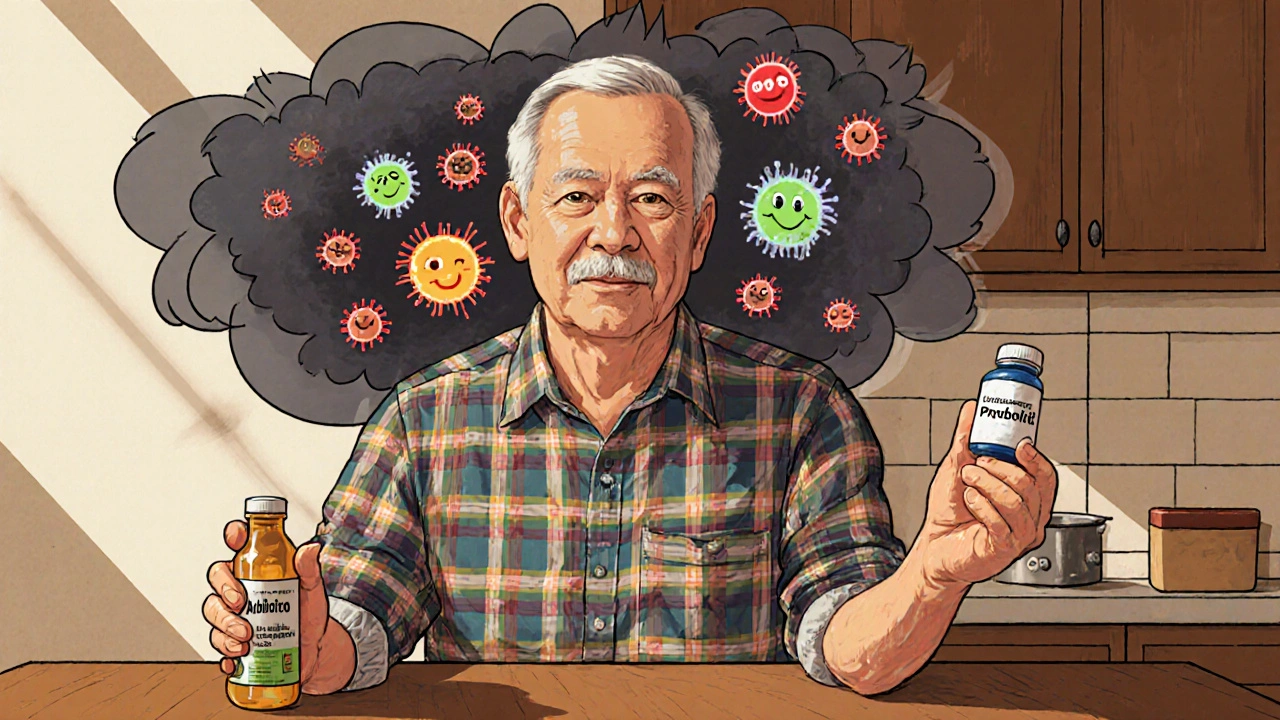So you’ve probably heard of antidepressants, but Wellbutrin—also known as bupropion—tends to stand out in a crowded medicine cabinet. What makes it so different? Sure, it treats depression. But the real story is a mix of science, personal twists, and even some surprising benefits (think: energy boosts, help quitting smoking, and an effect on sex drive that might make you do a double take). I’ve seen friends navigate the landscape of mental health meds, and let me tell you, Wellbutrin is one pill that keeps popping up in the real-life conversations, not just doctor’s offices and old-school pamphlets. Let’s get under the hood and see what all the fuss is really about.
How Wellbutrin Works and What Sets It Apart
Wellbutrin, or bupropion if you want the pharmaceutical name, isn’t your standard antidepressant. It’s in its own class: a norepinephrine-dopamine reuptake inhibitor, or NDRI for short. Unlike SSRIs—which focus on serotonin—Wellbutrin targets two different moods and motivation pathways in the brain. So instead of sedating you, it often wakes things up. People who struggle with low energy, trouble focusing, or those infamous "blah" days sometimes notice a little more mental spark with Wellbutrin, especially compared to meds that can leave you foggy.
There’s another big thing: weight gain, which is a top reason many bail on standard antidepressants, is a rare side effect here. Some people actually notice the scale tipping the other way. A recent study published in The Lancet Psychiatry in September 2023 compared weight changes across leading antidepressants and found that people using Wellbutrin lost an average of nearly 2kg in the first fourth months, whereas many others gained weight.
Wellbutrin isn’t just for depression, either. The FDA also recognizes it for helping people quit smoking. (That’s the same med, just called Zyban in that case.) You’ll see people using it off-label for ADHD, especially if the stimulants aren’t the right fit. The flexibility is part of the appeal, but also why it crops up in so many “Have you tried…?” discussions.
The Science and Stats: What the Research Shows
If you’re looking for hard numbers, Wellbutrin holds its own. Clinical trials tracked thousands of people since it launched in the 1980s. A summary table gives a glimpse of what’s out there:
| Aspect | SSRIs (e.g., Prozac) | Wellbutrin (Bupropion) |
|---|---|---|
| Success Rate in Major Depression | 60-67% | 62-70% |
| Time to Noticeable Effects | 2-4 weeks | 2-3 weeks |
| Typical Weight Change (6 months) | +2.5 to 7 kg | 0 to -2.5 kg |
| Sexual Side Effects Rate | 30-60% | 10-15% |
| Smoking Cessation Success Rate | Not indicated | 35-40% |
Notice that last line? The fact that wellbutrin genuinely increases the odds of quitting smoking by 35-40% compared to quit attempts without meds sets it in a category by itself. Plus, the lower sexual side effect profile matters. People who dread that "numbness" report Wellbutrin is the only antidepressant that helped them actually feel like themselves—emotionally and physically. That probably explains why you see so many folks on Reddit or in group chats recommending it when others get frustrated with standard meds.
There are clinical guidelines too. The American Psychiatric Association keeps Wellbutrin as a first-line recommendation for depression, especially for folks who haven’t done well on SSRIs or whose main struggle is fatigue. The World Health Organization lists bupropion among the essential medicines for mental health. For anyone worried about their risk of seizures (it’s a rare but real side effect – about 0.4% at prescribed doses, and more at higher ones), doctors are usually pretty careful about recommending it to people with a history of head trauma or eating disorders, where risk goes up.

Everyday Experiences: What Wellbutrin Feels Like
Let’s leave the charts aside. What’s it actually like to start Wellbutrin? Here’s where real life is a mash-up of stories, from smooth sailing to annoying bumps in the road. When my friend Jess started it, she felt buzzed, almost jittery, for the first week. But then she settled into something calmer and the energy she’d been missing started creeping back in. Some folks have the opposite, feeling like they drank too much coffee even after a month. That’s one reason docs often start with 75 mg or 100 mg and tweak from there.
The honeymoon phase is very real, but sometimes there’s a catch, especially in the beginning. Dry mouth is textbook. I kept a tumbler with ice chips on my nightstand for weeks, and gum became my new best friend. Others complain about headaches or occasional anxiety spikes—again, usually short lived. Then there’s the increased sweat. It’s bizarre but common: you’ll find threads full of people swapping tips on antiperspirants that can withstand a walk to the mailbox.
Sleeping patterns may shift. For a lot of folks, Wellbutrin means new morning routines. Take it too late in the day? You may find yourself rearranging your bookshelves at 2 a.m. That’s why daily dosing is often set for breakfast. Unlike with many antidepressants, vivid dreams or even slightly wonky sleep are normal. Partner tip: if you snore, try using a white noise machine for your bedmate’s sake. (Oliver swears by ours.)
The bright side is, so many say Wellbutrin lets them “wake up” after months stuck in a ho-hum rut. They’ll say, “It feels like I got my spark back.” That’s not a cure—therapy, routines, and real connections still matter—but for folks who feel like they disappeared inside their own skin, that extra daylight in the brain is worth gold. And for some, the famous Wellbutrin motivation bump means closets got organized, dusty projects got finished, and working out actually started feeling possible.
Tips, Dosage Tricks, and Practical Advice
Wellbutrin isn’t a magic happy pill, but heading off the weirdness helps smooth the ride. First thing: timing really matters. The immediate-release type needs split doses—usually morning and early afternoon. The XL (extended release) version is simpler: one big gulp with breakfast, and you’re set for the day. Always follow your doc’s plan, but if you’re dealing with insomnia, ask about switching the dose earlier.
If you miss a dose, don’t double up. Just wait and get back on schedule. Trust me: seizures are rare at regular doses, but cramming pills together can raise the risk. Safety first, always.
Hydration helps the dry mouth and the whole-body-tingle some mention. Stock up on sugar-free lozenges or mints. If anxiety hits at the start, give it two or three weeks before judging too much—most side effects fade as your body adjusts. And while Wellbutrin is much less likely to kill your sex drive, be open with your doctor if anything feels off. Sometimes it can actually increase desire, so yes, don’t be surprised if date night starts looking different.
If you’re quitting smoking, the quit line suggests starting Wellbutrin one or two weeks before your planned stop date. That way, it’s in your system and boosts your odds when you actually stub out that last cigarette.
Here’s a hack if you’re sensitive to caffeine: cut back the first week. Wellbutrin amps up brain energy, so double-stacking with coffee can make you feel uncomfortably wired. And if you’re prone to dry skin or sweating, opt for loose clothing and carry wipes when you’re out. Got kids in the house? Keep your medication locked—bupropion is dangerous in overdose, especially for children or pets.

Long-Term Outcomes and Life Beyond the Pill
What happens after six months, a year, or more with Wellbutrin? People often start to wonder if they’ll need to stay on it forever. Some do; some don’t. There’s solid research suggesting that, for people with recurrent depression, longer courses lower the odds of big relapses. But nobody likes to feel locked into a prescription for life.
Over time, the side effects you notice first usually fade. After the first month, that jittery feeling, the dry mouth, and the sleep quirks usually settle down for most folks. If weight loss or gain is going to happen, it typically shows up in the first three months, then levels off.
One cool fact: Wellbutrin has almost no effect on blood pressure for people with normal range, but if you already have hypertension, your doctor will keep an eye on your numbers. Regular check-ins—say, every three or six months—are key. Mental health is always shifting, and sometimes outside stuff (moving, loss, new work stress, or the springtime blues hitting harder than usual) means it’s time to tweak your plan.
It’s not addicting; you won’t get withdrawal if you stop cold-turkey, but a slow taper is still best if you’ve been taking it for a while, just in case you notice any mood swings or headaches. If you’re pregnant, planning pregnancy, or breastfeeding, this is something to talk through in detail. Data from a March 2024 review in JAMA Psychiatry showed no spike in birth defects or developmental issues, but it’s always a conversation between you, your partner, and your doctor.
The best advice I can give: don’t go it alone. Wellbutrin can be a life-changer, but the real work—and the real wins—are in routines, perspective shifts, and honest conversations. And don’t panic if it’s not instant magic; sometimes the biggest shift comes not from feeling “up,” but from finally, quietly feeling like you can meet the day head-on, and maybe even crack a smile. That’s the real power of a med like this—helping people make room for life again.


Earl Hutchins
May 29, 2025 AT 22:56Wellbutrin’s NDRI action gives it a distinct edge over the typical SSRI crowd.
By boosting dopamine and norepinephrine it can lift the fog without the heavyweight sedation.
Patients often notice a subtle increase in drive within the first two weeks, especially when the dose starts low.
The low‑weight‑gain profile also makes it a favorite for those worried about the scale.
Just remember to follow the titration schedule; skipping the split‑dose can spike side‑effects.
Tony Bayard
May 30, 2025 AT 18:20Picture a brain that has been stuck in grayscale for months, yearning for a splash of color.
Wellbutrin arrives like a sunrise, flooding the neural pathways with dopamine fireworks.
The first week can feel like an uninvited guest, jittery and hyper‑aware, but patience rewards the traveler.
By the third week, many users report a steadier rhythm, as if the internal metronome finally found its beat.
Because it sidesteps the serotonin‑only route, sexual dysfunction drops dramatically, a relief many describe as a reclaimed intimacy.
Weight trends often tilt downward, a side effect that some celebrate as a bonus rather than a goal.
When paired with a structured quit‑smoking plan, the success odds climb into the high thirties, a statistic that can tip the scales for lifelong smokers.
Clinicians appreciate the flexible dosing options-immediate release, SR, XL-allowing a tailored fit for each patient’s lifestyle.
However, the drug is not without its shadows; seizures, though rare, loom for high‑dose users or those with a seizure predisposition.
Dry mouth, insomnia, and occasional anxiety spikes are the most common early complaints, usually fading after a few weeks.
Monitoring blood pressure in hypertensive individuals is wise, as the stimulant‑like effect can nudge readings upward.
The medication’s half‑life supports once‑daily dosing for the XL form, simplifying adherence for busy lives.
Real‑world stories echo the data: people speak of reclaiming hobbies, finishing projects, and even feeling motivated to hit the gym.
Yet, the drug does not replace therapy; it’s a catalyst that lights the fire, while counseling provides the fuel.
In the end, Wellbutrin is a tool-powerful, nuanced, and best wielded with informed guidance.
Jay Crowley
May 31, 2025 AT 13:13Wellbutrin rarely causes weight gain, which many patients appreciate.
sharon rider
June 1, 2025 AT 08:06Across cultures the perception of mental health medication varies, yet the data on bupropion remains consistent.
Its dual action on dopamine and norepinephrine offers a mechanistic rationale that aligns with many eastern concepts of energy flow.
Patients who experience the ‘awakening’ often describe it as a subtle shift rather than a dramatic surge.
The modest sexual side‑effect profile can be especially significant in societies where intimacy is closely tied to identity.
Nonetheless, cultural stigma may still impede open discussion about such treatments.
swapnil gedam
June 2, 2025 AT 03:00In my practice I've observed that the initial titration phase is crucial for minimizing side effects.
Starting at 75 mg once daily and gradually increasing helps the body adapt to the dopaminergic boost.
Many patients report a dry mouth during the first fortnight, which can be alleviated with sugar‑free lozenges.
If insomnia emerges, shifting the dose to earlier in the morning often resolves the issue.
The medication's impact on smoking cessation is particularly valuable in populations with high tobacco use.
Weight changes tend to manifest within the first three months, after which the trend stabilizes.
Overall, a balanced approach that includes lifestyle counseling yields the best outcomes.
Michael Vincenzi
June 2, 2025 AT 21:53Great points, Swapnil!
I’d add that consistent sleep hygiene strengthens the adjustment period.
A simple routine-no screens an hour before bed-can curb the occasional nighttime restlessness.
Together with the dose timing, it makes the transition smoother.
Courage Nguluvhe
June 3, 2025 AT 16:46From a pharmacodynamic perspective, bupropion acts as a non‑competitive antagonist at the neuronal reuptake transporters for norepinephrine (NET) and dopamine (DAT).
This dual inhibition results in increased synaptic concentrations, thereby enhancing catecholaminergic neurotransmission.
Unlike serotonergic agents, the drug exhibits a negligible affinity for 5‑HT receptors, which accounts for its distinct side‑effect spectrum.
The high lipophilicity facilitates rapid crossing of the blood‑brain barrier, achieving therapeutic plasma levels within 48 hours of administration.
Clinically, this translates to an accelerated onset of antidepressant efficacy, often observed in the 2‑ to 3‑week window.
The metabolic pathway primarily involves CYP2B6 isoenzyme, generating active metabolites such as hydroxy‑bupropion.
Awareness of this hepatic route is essential when co‑prescribing agents that are CYP2B6 inhibitors or inducers.
Overall, the NDRI class offers a mechanistic alternative that addresses the dopaminergic deficits underpinning anhedonia.
Oliver Bishop
June 4, 2025 AT 11:40From an American perspective, it’s reassuring that the FDA has thoroughly vetted bupropion’s safety profile over decades.
The agency’s post‑marketing surveillance continues to monitor rare adverse events, keeping patients protected.
Moreover, the drug’s inclusion in the WHO essential medicines list reflects its global relevance, yet we should celebrate its home‑grown innovation.
Our domestic research pipelines have contributed significantly to understanding its mechanisms.
So, for anyone in the US, the regulatory backing adds a layer of confidence when choosing this treatment.
Alissa DeRouchie
June 5, 2025 AT 06:33Oh sure the FDA loves its own toys and throws a parade every time a pill gets a label.
But let’s not forget the millions who still suffer side effects that get buried under glossy brochures.
I mean really who decides what’s ‘safe’ when the data is sometimes as thin as a paper napkin.
The hype around ‘essential’ medicines can sometimes mask the gritty realities of individual reactions.
Emma Howard
June 6, 2025 AT 01:26If you stick with the schedule and stay hydrated, you’ll likely breeze through those first‑week quirks!
Hydration + consistent dosing = smoother ride.
dee gillette
June 6, 2025 AT 20:20While the literature emphasizes Wellbutrin’s favorable side‑effect profile, one must consider the methodological limitations of the cited trials.
Many studies suffer from short follow‑up periods and selective reporting, which can inflate perceived benefits.
Furthermore, the exclusion of patients with comorbid anxiety disorders restricts the generalizability of the findings.
Thus, clinicians should remain circumspect when extrapolating these results to broader populations.
Jasin P.
June 7, 2025 AT 15:13Oh wow, bravo for pointing out the obvious, Dee.
Because we all needed a reminder that science isn’t perfect.
Anyway, if you enjoy the gloom, feel free to keep the sarcasm coming.
Lily Đàn bà
June 8, 2025 AT 10:06Well, if you’re looking for a miracle pill, forget this drab NDRI and go chase the next hype.
The so‑called ‘energy boost’ is just a jittery sprint that crashes harder than a cheap fireworks display.
People rave about weight loss, yet many end up swapping one obsession for another.
Don’t be fooled by glossy Reddit testimonials; the reality can be brutally unglamorous.
Joseph O'Sullivan
June 9, 2025 AT 05:00Eh, Lily, calm down a bit, yeah?
I’ve seen folks actually benefit, especially the quit‑smoking angle.
Sure, it’s not a miracle, but it’s a tool, not a magic wand.
Conor McCandless
June 9, 2025 AT 23:53Allow me to elucidate the nuanced tapestry that is bupropion, for the sake of those who, like you, seek clarity amidst the clamor of simplistic dismissals.
First, the pharmacological architecture of this NDRI is a marvel of modern medicinal chemistry, deliberately crafted to circumvent the serotonergic pitfalls that plague many antidepressants.
By targeting both norepinephrine and dopamine reuptake, it orchestrates a symphony of neurotransmitter activity that can restore vigor to a mind long shrouded in apathy.
Clinical trials, some extending beyond the modest six‑month horizon, have repeatedly demonstrated modest yet statistically significant improvements in depressive scores.
Moreover, the ancillary benefits-namely the facilitation of smoking cessation-are not mere footnotes but integral components of its therapeutic profile.
Patients who have persisted with the medication often recount a gradual ascendancy from a nocturnal fog to a dawn of mental clarity.
It is, however, imperative to acknowledge the adverse spectrum: insomnia, dry mouth, and, in rare instances, seizures, each demanding vigilant monitoring.
The risk of seizures, while infrequent, escalates with higher dosages and pre‑existing risk factors, underscoring the necessity of individualized dosing regimens.
From a metabolic standpoint, bupropion is primarily processed by CYP2B6, a fact that bears relevance when co‑administering agents that inhibit or induce this enzyme.
This interaction potential, though often overlooked in cursory discussions, can precipitate elevated plasma concentrations, thereby amplifying side effects.
Equally important is the psychosocial context: patients are more likely to adhere when counseling, lifestyle modification, and realistic expectations accompany the prescription.
The myth that weight loss is a guaranteed side effect must be tempered; while some experience modest reductions, others remain weight‑stable, and a minority may even gain.
In light of these complexities, the clinician’s role transcends mere prescription, encompassing education, monitoring, and, when necessary, judicious tapering.
Abrupt discontinuation is ill‑advised, as it may precipitate a rebound of depressive symptoms, though a slow taper typically mitigates such risks.
Lastly, let us not forget the ethical dimension: prescribing any psychotropic demands an informed consent process that transparently delineates benefits, risks, and alternatives.
Thus, to reduce bupropion to a mere ‘energy pill’ is to disregard the depth of evidence and the lived experiences of countless patients who have found it a valuable ally.
kat gee
June 10, 2025 AT 18:46Wow, a pill that makes you a little less lazy? Groundbreaking.
Iain Clarke
June 11, 2025 AT 13:40For those unsure about timing, the extended‑release formulation should be taken with breakfast to minimize insomnia.
If you experience dry mouth, sugar‑free lozenges are a practical remedy.
Regular follow‑ups every three months help assess efficacy and any emerging side effects.
Courtney Payton
June 12, 2025 AT 08:33I cant help but wonder why we keep singing the same praiseful tune for wellbutrin.
Sure it works for some, but the data isnt as glossy as the reddit hype.
The occasional headache and jittery feeling can be a real turn off.
Patients should be warned about the rare seizure risk, even if it feels like a distant worry.
It's a matter of balancing hope with honest counselling.
Muthukumaran Ramalingam
June 13, 2025 AT 03:26Look man, I’ve been on Wellbutrin for a few months and I gotta tell you the first week was like having a coffee shot straight to the brain.
I couldn’t sleep at night, was pacing my room, and my mouth was as dry as a desert.
But I didn’t quit, because the doctor told me it would settle after a couple of weeks.
By the time week three rolled around, I started feeling more awake for my morning runs and the cravings for cigarettes dropped like a stone.
I also noticed my jeans fitting a little tighter, not because I gained weight but because I was actually eating a bit more, which is a side effect some folks talk about.
The dry mouth thing can be handled with water and gum, no big deal.
If you have any heart issues or high blood pressure, keep an eye on it, because this drug can give a tiny bump.
Overall, it’s not a miracle cure, but it’s a useful tool if you pair it with proper diet, exercise, and a solid support system.
Garrett Williams
June 13, 2025 AT 22:20Stay positive, keep the routine steady, and you’ll likely see the brighter side of Wellbutrin in no time!